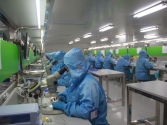
Managing the fallout: The impact of the Fukushima disaster on Japan's food exports
The explosions at the nuclear reactors at the Fukushima Daiichi nuclear complex have also raised concerns about the radiation effects on food supplies.
According to Satish Lele, Vice President, Industrial Practice, Asia Pacific, Frost & Sullivan, several countries like China, Hong Kong and other Southeast Asian countries have put in place preventive measures to check contamination levels of Japanese food imports.
A nuclear fallout will release radioactive particles into the atmosphere and these will contaminate the surface on which they are deposited. This would mean standing crops, fruit and vegetable farms, grazing land and water sources. This would then find its way into humans if they consume the food directly or indirectly through milk and meat products from animals who consume contaminated vegetation and water.
A number of consumers have been concerned about the safety of Japanese food following the release of radioactivity. They have been asking local retailers about the safety of farm and dairy produce imported from Japan, since most of these products are typically flown in.
Is the threat real?
The current levels of radioactivity reported at Fukushima do not warrant any panic. Moreover the radiation has been contained to with a 20km radius of the nuclear power plant. This area has been completely evacuated so it is unlikely that any farm produce will find its way into the market. However it is extremely important that the situation is not allowed to deteriorate any further, and the authorities are able to contain the disaster at current levels.
Earlier reports indicate high levels of radioactive iodine and cesium in the vicinity of the power plants. Radioactive iodine has a shorter half life so its effect is limited. However half life of Cesium is about 30 years, so its effect is seen over a long period of time. This would effectively mean that the entire area around the 20 km radius will not be usable for a long period of time.
Long term implications
Japan would have to manage the effects of this disaster very carefully, both in terms of how it produces energy safely in the future as well as managing the effects of released radiation in the atmosphere. Consumer perception about safety is very strong and even though the food is eventually determined safe for consumption, it will have an impact in the short term in terms of falling sales. Depending on the eventual severity of the nuclear fallout, it may have serious implications in the longer term on Japanese food products.
























 Advertise
Advertise










